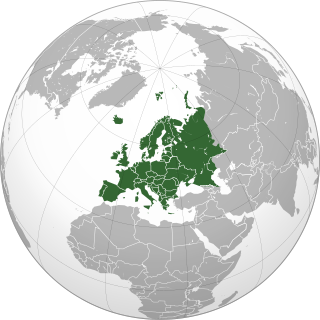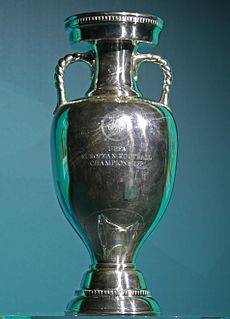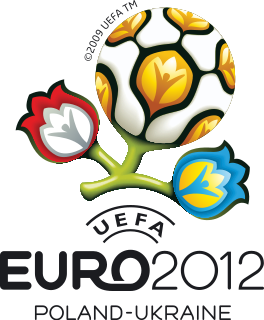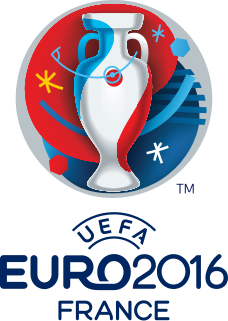
Azerbaijan, officially the Republic of Azerbaijan, is a country located at the boundary of Eastern Europe and Western Asia. It is a part of the Caucasus region, and is bounded by the Caspian Sea to the east, Russia to the north, Georgia to the northwest, Armenia and Turkey to the west, and Iran to the south.

Belgium, officially the Kingdom of Belgium, is a country in Western Europe. It is bordered by the Netherlands to the north, Germany to the east, Luxembourg to the southeast, France to the southwest, and the North Sea to the northwest. It covers an area of 30,689 km2 (11,849 sq mi) and has a population of more than 11.5 million, making it the 22nd most densely populated country in the world and the 6th most densely populated country in Europe, with a density of 376 per square kilometre (970/sq mi). The capital and largest city is Brussels; other major cities are Antwerp, Ghent, Charleroi, Liège, Bruges, Namur, and Leuven.

Europe is a continent located entirely in the Northern Hemisphere and mostly in the Eastern Hemisphere. It comprises the westernmost peninsulas of the continental landmass of Eurasia, and is bordered by the Arctic Ocean to the north, the Atlantic Ocean to the west, the Mediterranean Sea to the south, and Asia to the east. Europe is commonly considered to be separated from Asia by the watershed of the Ural Mountains, the Ural River, the Caspian Sea, the Greater Caucasus, the Black Sea, and the waterways of the Turkish Straits. Although much of this border is over land, Europe is generally accorded the status of a full continent because of its great physical size and the weight of its history and traditions.

The European Union (EU) is a political and economic union of 27 member states that are located primarily in Europe. The union has a total area of 4,233,255.3 km2 (1,634,469.0 sq mi) and an estimated total population of about 447 million. An internal single market has been established through a standardised system of laws that apply in all member states in those matters, and only those matters, where the states have agreed to act as one. EU policies aim to ensure the free movement of people, goods, services and capital within the internal market; enact legislation in justice and home affairs; and maintain common policies on trade, agriculture, fisheries and regional development. Passport controls have been abolished for travel within the Schengen Area. A monetary union was established in 1999, coming into full force in 2002, and is composed of 19 member states which use the euro currency. The EU has often been described as a sui generis political entity with the characteristics of either a federation or confederation.

The euro is the official currency of 19 of the 27 member states of the European Union. This group of states is known as the eurozone or euro area and includes about 343 million citizens as of 2019. The euro, which is divided into 100 cents, is the second-largest and second-most traded currency in the foreign exchange market after the United States dollar.

Germany, officially the Federal Republic of Germany, is a country in Central Europe. It is the second-most populous country in Europe after Russia, and the most populous member state of the European Union. Germany is situated between the Baltic and North seas to the north, and the Alps to the south; covering an area of 357,022 square kilometres (137,847 sq mi), with a population of over 83 million within its 16 constituent states. It borders Denmark to the north, Poland and the Czech Republic to the east, Austria and Switzerland to the south, and France, Luxembourg, Belgium, and the Netherlands to the west. The nation's capital and largest city is Berlin, and its financial centre is Frankfurt; the largest urban area is the Ruhr.

The Indo-European languages are a language family native to western and southern Eurasia. It comprises most of the languages of Europe together with those of the northern Indian subcontinent and the Iranian Plateau. Some European languages of this family, such as English, French, Portuguese, Russian, Dutch and Spanish, have expanded through colonialism in the modern period and are now spoken across several continents. The Indo-European family is divided into several branches or sub-families, of which there are 8 groups with languages still alive today: Albanian, Armenian, Balto-Slavic, Celtic, Germanic, Hellenic, Indo-Iranian, and Italic; and another 6 subdivisions which are now extinct.

In the history of Europe, the Middle Ages or medieval period lasted approximately from the 5th to the late 15th centuries. It began with the fall of the Western Roman Empire and transitioned into the Renaissance and the Age of Discovery. The Middle Ages is the middle period of the three traditional divisions of Western history: classical antiquity, the medieval period, and the modern period. The medieval period is itself subdivided into the Early, High, and Late Middle Ages.

Poland, officially the Republic of Poland, is a country located in Central Europe. It is divided into 16 administrative provinces, covering an area of 312,696 square kilometres (120,733 sq mi), and has a largely temperate seasonal climate. With a population of nearly 38.5 million people, Poland is the fifth most populous member state of the European Union. Poland's capital and largest metropolis is Warsaw. Other major cities include Kraków, Łódź, Wrocław, Poznań, Gdańsk, and Szczecin.

Russia, or the Russian Federation, is a country spanning Eastern Europe and Northern Asia. It is the largest country in the world, covering over 17 million square kilometres, and encompassing more than one-eighth of Earth's inhabited land area. Russia extends across eleven time zones, and has borders with sixteen sovereign nations. It has a population of 146.2 million; and is the most populous country in Europe, and the ninth-most populous country in the world. Moscow, the capital, is the largest city in Europe, while Saint Petersburg is the nation's second-largest city and cultural centre. Russians are the largest Slavic and European nation; they speak Russian, the most spoken Slavic language, and the most spoken native language in Europe.

The Romani people, also known as the Roma, are an Indo-Aryan people, traditionally nomadic itinerants living mostly in Europe, as well as diaspora populations in the Americas.

The Union of European Football Associations is the administrative body for football, futsal and beach soccer in Europe. It is one of six continental confederations of world football's governing body FIFA. UEFA consists of 55 national association members.

The UEFA Champions League is an annual club football competition organised by the Union of European Football Associations (UEFA) and contested by top-division European clubs, deciding the competition winners through a round robin group stage to qualify for a double-legged knockout format, and a single leg final. It is one of the most prestigious football tournaments in the world and the most prestigious club competition in European football, played by the national league champions of their national associations.

The UEFA European Football Championship, commonly known as the UEFA European Championship and informally as the Euros, is the primary association football competition contested by the senior men's national teams of the members of the Union of European Football Associations (UEFA), determining the continental champion of Europe. The competition has been held every four years since 1960, except for 2020, when it was postponed until 2021 due to the COVID-19 pandemic in Europe. Scheduled to be in the even-numbered year between World Cup tournaments, it was originally called the European Nations' Cup, changing to the current name in 1968. The championships are often referred to in the form "UEFA Euro [year]".

The 2008 UEFA European Football Championship, commonly referred to as UEFA Euro 2008 or simply Euro 2008, was the 13th UEFA European Championship, a quadrennial football tournament contested by the member nations of UEFA. It took place in Austria and Switzerland from 7 to 29 June 2008.

The 2010–12 UEFA European Football Championship, commonly referred to as 2012 UEFA European Championship, UEFA Euro 2012 or simply Euro 2012, was the 14th European Championship for men's national football teams organised by UEFA. The final tournament, held between 8 June and 1 July 2012, was co-hosted for the first time by Poland and Ukraine, and was won by Spain, who beat Italy 4–0 in the final at the Olympic Stadium, Kyiv, Ukraine.

France, officially the French Republic, is a country primarily located in Western Europe, consisting of metropolitan France and several overseas regions and territories. The metropolitan area of France extends from the Rhine to the Atlantic Ocean and from the Mediterranean Sea to the English Channel and the North Sea. The overseas territories include French Guiana in South America and several islands in the Atlantic, Pacific and Indian Oceans. France borders Belgium, Luxembourg and Germany to the northeast, Switzerland, Monaco and Italy to the east, Andorra and Spain to the south, as well as the Netherlands, Suriname and Brazil in the Americas. The country's eighteen integral regions span a combined area of 643,801 km2 (248,573 sq mi) and a total population of 67.413 million. France is a unitary semi-presidential republic with its capital in Paris, the country's largest city and main cultural and commercial centre. Other major urban areas include Lyon, Marseille, Toulouse, Bordeaux, Lille and Nice. France, including its overseas territories, has the most time zones of any country, with a total of twelve.

The 2016 UEFA European Football Championship, commonly referred to as UEFA Euro 2016 or simply Euro 2016, was the 15th UEFA European Championship, the quadrennial international men's football championship of Europe organised by UEFA. It was held in France from 10 June to 10 July 2016. Spain were the two-time defending champions, having won the 2008 and 2012 tournaments, but were eliminated in the round of 16 by Italy. Portugal won the tournament for the first time, following a 1–0 victory after extra time over the host team, France, in the final played at the Stade de France.

Turkey, officially the Republic of Turkey, is a country straddling Western Asia and Southeast Europe. It shares borders with Greece and Bulgaria to the northwest; the Black Sea to the north; Georgia to the northeast; Armenia, Azerbaijan, and Iran to the east; Iraq to the southeast; Syria and the Mediterranean Sea to the south; and the Aegean Sea to the west. Istanbul, the largest city, is the financial centre, and Ankara is the capital. Turks form the vast majority of the nation's population, and Kurds are the largest minority.

The 2020 UEFA European Football Championship, commonly referred to as 2020 UEFA European Championship, UEFA Euro 2020, or simply Euro 2020, is the 16th UEFA European Championship, the quadrennial international men's football championship of Europe organised by the Union of European Football Associations (UEFA).



















